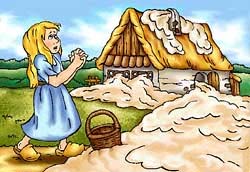 I got motivated from our previous fairytale discussion and dug out yet another Czech (and also Slovak?) fairytale classics, this time it is called ‘Cook, Mug, Cook!’ (‘Hrnecku,var!’). I was so happy to find a YouTube movie that goes along with it! It is a silent movie so anyone can watch it 🙂
I got motivated from our previous fairytale discussion and dug out yet another Czech (and also Slovak?) fairytale classics, this time it is called ‘Cook, Mug, Cook!’ (‘Hrnecku,var!’). I was so happy to find a YouTube movie that goes along with it! It is a silent movie so anyone can watch it 🙂
CZ: Z nasi posledni pohadkove diskuze jsem se rozhodla ozivit dalsi klasickou ceskou pohadku, tentokrat “Hrnecku, var!” Diky Marice a jeji zlate dcerce Michelle, mam take ten anglicky preklad, tak je to kompletni. Dokonce jsem i nasla YouTube video!!
COOK, MUG, COOK!
Once there was a poor widow who lived in a village with her daughter. All they possessed was an old cottage with a leaky roof and a handful of hens in the attic. During the winter the mother gathered wood in the forest and in the summer she picked woodland berries, whilst in the autumn she scrounged what she could get from the fields. The girl collected the eggs which the hens laid in the attic and took them to the town market to sell. This is how they survived.
One summer’s day the mother felt ill, so the daughter had to go to the forest to pick the berries, as they had nothing to eat at home. She took an empty pot with her and a slice of black bread. When the pot was full, the girl sat down beside a well to rest and to eat her bread. It was exactly midday.
Suddenly an old woman appeared, dressed in rags like a beggar. In her hand she held an empty mug.
“Oh, my dear girl,” the old woman sighed, “how I should like something to eat! Not a single morsel has passed my lips these last two days. Could you spare me a piece of your bread?”
“Why not?” the girl replied readily, “have all of it, please do! I only hope that you won’t find it too hard to swallow.”
With that she gave the old beggar woman all her lunch.
“Lord be praised, my girl, Lord be praised!” the old woman cried. “As you have shown such kindness to me, I will give you something too. Here take this mug. When you get home, put it on the table and say, ‘Cook, mug, cook!’ and it will cook as much semolina pudding as you wish. When you have enough simply say: ‘Stop, mug, stop!’ and it will stop cooking. But do not forget these words.”
With that the old woman handed the mug over and disappeared.
When the girl returned home, she told her mother what had happened in the forest, and she placed the mug on the table and commanded, ‘Cook, mug, cook!’ to see whether the old woman had been telling the truth. And wonder of wonders! Semolina pudding rose from the base of the mug, bubbling and growing, and before one could count up to ten, the mug was overflowing.
“Stop, mug, stop!” the girl cried, and the mug stopped at once.
Mother and daughter sat down and tucked in with relish. The pudding was quite delicious.
After their meal, the girl put some eggs in a basket and went to the market. But no one wanted to pay the price she asked for the eggs, and it was dusk by the time she managed to sell them.
The widow sat at home, longingly gazing at the mug, for she was hungry again. “I don’t have to wait,” she though in the end, and placing the mug on the table, she commanded “Cook, mug, cook!” The semolina pudding began to bubble and grow, and before the woman turned around, the mug was full.
“I must fetch a dish and a spoon,” the widow muttered and went to the scullery.
When she returned, she nearly died of fright. Thick semolina pudding was pouring from the mug on to the table, from the table to the bench, and from the bench to the floor. For the life of her, the mother could not remember how to stop the mug from making more semolina pudding.
She slammed the dish over the mug, but that was no good. The dish fell to the floor and broke into tiny pieces, and out poured the semolina, just like a white flood.
There was so much of it in the kitchen, that the woman had to escape to the bedroom. She wrung her hands and lamented, “Oh, what an evil gift my unfortunate daughter has brought home1 I thought right from the start that it would do us no good at all!”
By now the semolina was pouring out of the kitchen into the bedroom; the pile grew thicker and higher by the minute.
The mother was at her wits end, so she climbed to the attic, sobbing and lamenting ceaselessly.
The semolina mountain grew and grew, and before long it was rolling out of the cottage door and windows like thick white clouds, flooding the road and piling up on the village square. Goodness knows where it would have ended, had the daughter not returned and commanded, “Stop, mug, stop!”
But by now there was such a great pile of pudding covering the square, that when the farmers were returning from the fields that night, they had no option but to eat their way through the mountain of semolina in order to get to their homes.
It took three whole days for the villagers to clear away all the semolina and after that, the daughter took good care to look after the mug herself. You may be sure that she never forgot the magic words, ‘Stop, mug, stop!’
CZ: Bylo jednou jedno zbožné děvčátko, které žilo s matičkou v chalupě, kde si podávaly dveře bída s nouzí, a tak mu nebylo ani do skákání ani do výskání. Jednou šlo zase do lesa pro nějakou tu jahodu, a tu potkalo stařenku, která dobře věděla o jeho starosti, slyšela o jeho žalosti, a tak mu darovala hrneček s kouzelným přikázáním. Mělo mu prý povědět: „Hrnečku, vař!” a bude v mžiku plný sladké prosné kaše, až se člověku seběhnou všecky sliny. Bude-li mít dost, stačí když řekne „Hrnečku, dost!” a bude po vaření. A taky bylo! Děvčátko poděkovalo, popadlo hrníček a pelášilo domů k mamince, aby tam jedly a jedly; a že té kaše bylo, co si jejich hrdla ráčila!
Kterého si dne, děvčátko muselo zrovna někam odběhnout, přišla matičce slina na kaši, a tak pravila: „Hrnečku vař!” Kaše byla hotová, než by jeden okem mrknul, a matička se cpala až k břicha prasknutí, a když měla dost, přála si, aby hrneček s vařením přestal, ale zapomněla to správné přikázání. A protože hrneček jinému nerozuměl, vařil dál a dál, kaše přetekla přes okraj a za chvíli jí byla plná kuchyně, pak celý dům, až se vydala na ulici a že by si vyšla do světa; no to už bylo už k úzkosti, neboť se valila dál a dál a žádný z lidí si nevěděl rady.
Na poslední chvíli přišla záchrana, děvčátko se vrátilo domů, a když tu spoušť vidělo, zhurta křiklo: „Hrnečku, dost!” A hrneček poslechnul a přestal vařit. Inu, právě včas! Stejně se tenkrát musel každý, kdo chtěl do města, tou sladkou kaši prokousat.





Je zajimave, ze v takove hrozne dobe bylo vytvoreno docela dost zajimavych filmu (vcetne pohadek)….
Lide asi vkladali svou nestastnou dusi do fantazie…
Dobrý den,
hezký překlad, potěší srdíčko.
Ale mám pocit, že si přivlastňujeme obecný majetek – ta pohádka bude podle všeho spíš než “typicky česká” “typicky středoevropská”. Neznám dobře sbírku německých pohádek od bratří Grimmů, ale skoro bych se vsadil, že by se tam našla.
Já jsem chtěl najít překlad pro kolegy chemiky, abych jim trochu přiblížil, jak může dopadnout exotermní reakce viskózní směsi, a natrefil jsem přitom i na německý text “Der süße Brei”.
Průpovídka v něm zněla “Töpfchen, koch!”, což přesně odpovídá názvu naší pohádky.
Zdravím mnohokrát,
TK